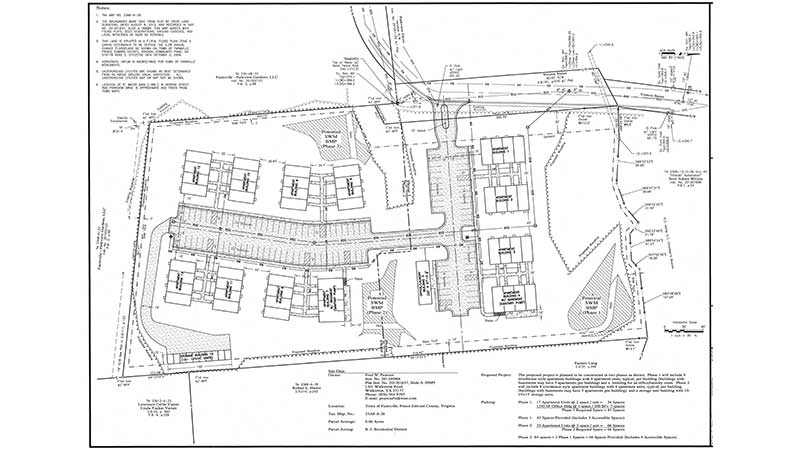Farmville Planning Commission discusses upcoming changes
Published 5:51 pm Sunday, January 1, 2023

- Pictured are conceptual plans of a proposed 52-unit apartment community in the area of Vernon Street, adjacent to the existing Parkview Gardens apartment community.
|
Getting your Trinity Audio player ready...
|
FARMVILLE – The way we use zoning to develop property and plan for the future will be changing. That’s what members learned at the Wednesday, Dec. 21 meeting of the Farmville Planning Commission.
The two main topics focused on a new type of zoning device called Planned Unit Developments and statewide changes to the Floodplain Ordinance.
Planned Unit Developments
The Planned Unit Development (PUD) is a process that the planning commission is considering adding to its “toolbox for smart growth.” The PUD gives diverse housing options, environmental sensitivity and other goals in the comprehensive plan for short and long-term plans.
“This isn’t a response to a single project,” said Farmville Planning Commissioner John Miller. “We’re thinking about a long-term kind of vision, a long-term process. One that is fair to developers in terms of being consistent and clear, but also a process that is meaningful and adds value to the community and our citizens as well in terms of ensuring that we have quality growth, quality building but also multiple opportunities for the public to give their input.”
Farmville Director of Community Development Lee Pambid, explained more about what rezoning processes will look like in the PUDs and the flexibility it provides.
“Our current ordinance and subdivision ordinance forces developers into a cookie-cutter pattern and there’s really no way around that,” said Pambid. “You have a very specific lot size, very specific setbacks and so on and so forth and there’s very little in terms of being able to mix and match different housing types and mixes of uses so you can also have convenient parking or retail or commercial.”
Even though the PUD opens the door for developers to have some flexibility and variety it doesn’t mean everything will come to fruition. Public hearings and other measures will allow citizens, the Planning Commission and the Town Council to speak out against or stop anything they feel doesn’t fit Farmville. Before anything is publicly advertised, staff will work with the applicants to give guidance and steer towards a compatible plan.
To better put together information to present to the commission and the public, Miller and Pambid will meet in preparation for the next meeting to answer the commission’s questions and have a more unified presentation for the public on what the PUD will look like once adopted.
Citizens will have numerous opportunities to give their input before the plan is solidified sometime this spring. The commission agreed to plan a second engagement meeting in hopes of getting even more of the public involved and informed. The first meeting will take place at 6 p.m. Thursday, Jan. 12, at the Moton Museum, 900 Griffin Blvd. A second one will be in February with the time and date currently pending.
Floodplain Ordinance
The Virginia Department of Conservation and Recreation is reviewing flood planning statewide. Farmville has already had two community assistance visits this summer with one in person and one virtually. After the visits, they recommended some enhanced policies and procedures relating to management, enforcement and permit review. These ordinances are not Farmville specific as similar recommendations are being made across the state.
According to Pambid, floodplain ordinances are intended to enhance community safety and mitigate repeated damage and lost individual properties. The floodplain is also known as a special flood hazard area.
“When we get a permit for development in the floodplain even if it’s just for a house or a deck or anything like that, then the floodplain ordinance comes into play,” said Pambid. “The floodplain ordinance is actually nested into the zoning ordinance.”
The floodplain ordinance is connected to the building and land development codes. It’s also tied to local and regional response as floods do not discriminate where they go or what they damage.
Environmental protection also comes into play when looking at this ordinance. Even though development should be discouraged in the floodplain, it is still possible for construction to take place under certain circumstances outlined in the ordinance.
A third community assistance visit is scheduled for the beginning of January as a virtual call. According to Pambid, the state has requested for this to be addressed as quickly as possible, but this shouldn’t take much staff time to process. The changes will be ready to present for next month’s meeting.





